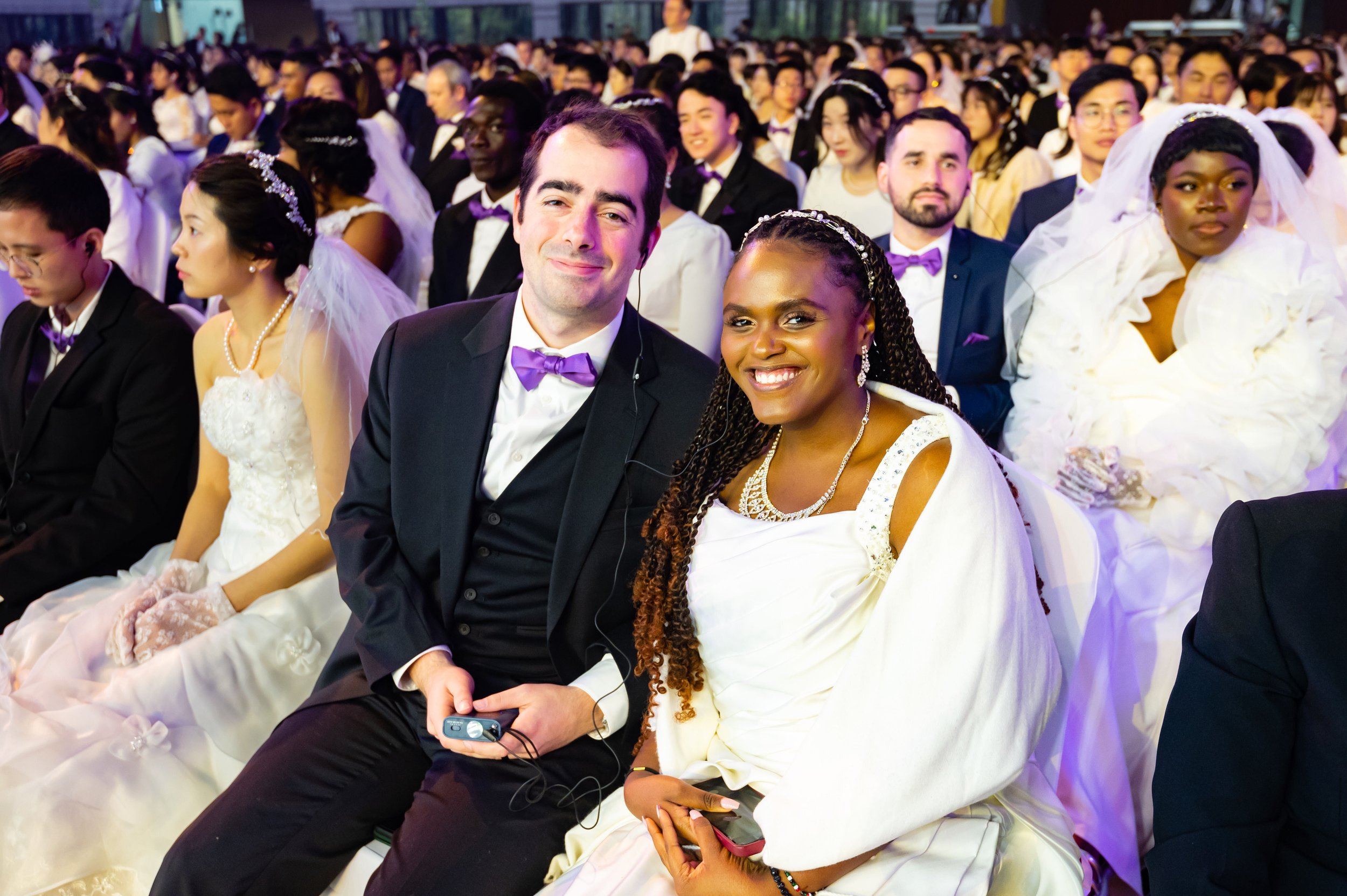Marriage Is a Family Effort
Photo courtesy of Elijah Maddox
By Elijah Maddox
I always liked the idea of getting married. When I was a small child, I looked up to my parents’ marriage. No matter how many ups and downs we went through as a family, there was always love in the home. For that, I consider myself lucky. I still view my parents as a hopeful example of what married life can be. They are my first teachers, my role models for where I would like to be in a few decades. Somehow, it was never strange to me to start this thought process at a young age. It seemed like common sense to me at the time. Now that I’m not quite as young, I’ve had to put more thought into the what and the why. What really is marriage, and why do I want it so badly in my life?
“A wife loves her husband not for his own sake, dear one, but because the Divine Beloved lives in him. A Husband loves his wife not for her own sake, dear one, but because the Divine Beloved lives in her.”
Marriage is Sacred
A good marriage is something almost anyone can look up to. Historically, marriage has long been acknowledged as a necessary and worthwhile part of life. In the book of Genesis, it says, “Therefore a man shall leave his father and his mother and hold fast to his wife, and they shall become one flesh.” (Genesis 2:24) Later, scripture tells us, “He who finds a wife finds a good thing and obtains favor from the Lord.” (Proverbs 18:22) These verses tell us that God has intended for humanity to form marriage bonds and that they are a good thing. This one sacred relationship in our lives is part of our ultimate purpose, and we don’t just have to take the Judeo-Christian word for it.
In the Hindu tradition, it is said that “A wife loves her husband not for his own sake, dear one, but because the Divine Beloved lives in him. A Husband loves his wife not for her own sake, dear one, but because the Divine Beloved lives in her.” (The Brihadaranyaka Upanishad) These different faith traditions teach us that marriage is sacred and that its value in each of our lives cannot be measured.
Young People Are Divided on Marriage
However, marriage has also often been romanticized. The fairytale versions of love and marriage that many of us fixate on in our youth can seem unattainable in the real world of complicated relationships and tedious responsibilities. People can compare the fairytale with reality and become jaded. It’s no wonder. Feeling that real love and lasting marriage are ultimately unattainable is enough to drive anybody away from the whole concept. In fact, the younger generation in America today is experiencing exactly that. According to a Pew Research Center survey in 2024, “Among all adults ages 18 to 34, 20% say being married is extremely or very important for people to live a fulfilling life.” That means that a large majority of our young people view it as unimportant. They have lost faith in the idea of marriage. We as a society are in danger of losing marriage altogether.
“Among all adults ages 18 to 34, 20% say being married is extremely or very important for people to live a fulfilling life.”
Compatibility Is About Partnership
In my case, thankfully, the idea of marriage still has some hold on me. I was fortunate to be able to start on my marriage journey a year ago with my lovely wife, Afi. As wonderful a journey as it’s been so far, it has been far from smooth sailing. If anything, it’s been the most tumultuous experience of our lives. We come from different worlds, we have different characters and goals, and we watch different movies. We seem incompatible with many modern standards of relationship ideals. But we haven’t seen it that way. The inherent challenges and unpredictable nature of the journey are all things we’ve come to embrace and have grown together all the more for it. But it does still raise the question of how to best create an environment for a successful marriage at all?
We Need Marriage
Being raised in the Unificationist faith, prioritizing marriage has always been one of our community's core values. We hold marriage in the highest esteem, striving to cultivate joyful and fulfilling relationships. “We need marriage,” Mother Moon commented at a prayer breakfast, “because it is the true way to develop our love. In marriage, we ripen as a seed of God. Our entire life should be centered on true love. We should be born in true love; we should grow in true love; we should live centered on true love, and we should return to true love when we die.” Based on this vision, we understand the significance of centering our lives around the love we nurture in our marriages. By doing so, regardless of the challenges we face, we can mature as the seeds of God.
Marriage serves as the key to unlocking our true value as human beings that God created us to embody. But it takes that partnership, that unity of a man and woman, to fully embody it. As impossible as that can seem at times, the transformative power and beauty of the end result are more than enough reasons to make it a life priority.
“We need marriage because it is the true way to develop our love. In marriage, we ripen as a seed of God. Our entire life should be centered on true love. We should be born in true love, we should grow in true love, we should live centered on true love, and we should return to true love when we die.”
It’s a Family Affair
Any daunting and difficult task, such as building an ideal marriage, can be made more manageable through teamwork. Our belief is that couples should not have to face this journey alone. What are family and community for if not for supporting us through this? In the Unificationist faith, the role of family support is key in nurturing healthy and enduring marriages. Parents bear the responsibility to first cultivate their own long and fruitful relationships. Then, in due time, it becomes natural that they would share the fruits of their long and successful marriages with their adult children who are starting their own marriage journeys. The same can be said for extended families and communities. The collective wisdom of our elders can lift much of the burden on young couples, sparing them from having to figure everything out on their own. Relationships are hard. Why not rely on someone whose experience you can trust?
Personal Responsibility is Key
This idea might sound strange to modern ears, but the truth is that these practices have existed for centuries. Family involvement in marriage is a longstanding tradition observed worldwide, with Christianity, Judaism, and Hinduism highlighting parental involvement in courtship. Unificationism follows a similar approach.
Courtships or arranged marriages might seem strange and old-fashioned today, but marriage based solely on physical attraction and short-term desire could be said to be equally, if not more, strange. The importance of personal commitment and choice in marriage cannot be overstated. The role of parental involvement is not to dictate decisions for the couple. Spouses in the Unificationist faith are not assigned but rather introduced. If a couple meets and wants to move towards marriage, parental involvement is not about allowing or forbidding, but rather about encouraging or cautioning.
Ultimately, the couple must make the choice to pursue the relationship and commit to a lasting marriage. All of this underscores the significance of personal agency in marital relationships.
Community Is a Resource
I learned many lessons on love and marriage from my faith community. Initially, it was observing my parents—watching their conversations, their conflict resolution, and their teamwork in creating a life for our family—that laid the foundations of my understanding of relationships. Truly, family is the school of love. But as I entered my teens and twenties, I expanded this influence to include other couples within my community. Mentors from church, coworkers with a few years on me, and even a few peers who had married before I did, all played a role. I surrounded myself with couples who had something to teach me, and I was eager to learn. Often, I would glean just one simple lesson or make one small observation from another couple, but over time, these lessons accumulated into my personal roadmap for relationships.
Combined with a plethora of written materials aimed at helping young couples engage in deep and meaningful conversations, this allowed me to approach my own relationship with clarity and focus. I understood the importance of having a vision for my marriage, one that aligned with the original purpose of becoming an embodiment of God’s ideal together with my spouse. I’d learned many tips, tricks, and techniques to help me get there, but that goal was fundamental above all else. It’s what separated marriage from a casual relationship in my heart.
Don’t Do It Alone
Any sane person is still going to need support navigating all the complexities of marriage. That’s why not trying to do it alone is so important. We need support—family and community—despite acknowledging that our families may not be perfect and our communities may have flaws. But without some kind of guidance and example, it is far too easy to become lost, aimless, and hopeless in a marriage lacking purpose. Our young generation today is lonely and disconnected. But we don’t have to be. What we need is an environment that fosters connection, support, and guidance. It begins with a simple choice: to seek out community, support, and guidance from those with wisdom to offer, and ultimately, to commit to nurturing strong marital relationships.
Don’t search endlessly on your own. Find your community. Make the choice to build your vision for a God-centered relationship. With love, support, and dedication, fulfilling relationships are achievable. To every young person looking for real love, I say that it is within your grasp—with a little help.


